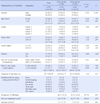Abstract
Purpose
The purpose of this study is to investigate influence of cellular phone videos and games on dry eye syndrome in university students.
Methods
A randomized comparison group pre-post design is used. Sixty university students were randomly assigned to either a video or a game group. Frequencies of blinking, dry eye symptoms scores and amounts of tears were measured. Thirty subjects watched cellular phone video programmes and the other 30 subjects played cellular phone games for 61 minutes. In addition, frequencies of blinking were measured three times during treatment, once immediately after a treatment and twice at an interval of 20 minutes after subsequent treatments.
Results
Post-test scores of frequencies of blinking significantly decreased, dry eye symptoms scores including amounts of tears significantly increased greater than pre-test scores in both groups. But there were no significant differences between the groups. Frequencies of blinking were significantly different with respect to the time spent using cellular phone. In both groups, the lowest frequencies of blinking were shown after 40 minutes of cellular phone use.
Figures and Tables
 | Figure 1The change of frequency of blinking according to time.
A=Before smartphone use; B1=20 minutes after smartphone use; B2= 40 minutes after smartphone use; B3=60 minutes after smartphone use; C1=immediately after remove smartphone use; C2=20 minutes after remove smartphone use; C3=40 minutes after remove smartphone use.
|
References
1. Korea Communication Commission. Wire/wireless telecommunication service subscribers statistics [Internet]. Gwacheon: Korea Communication Commission;2013. cited 2013 July 4. Available from: http://www.kcc.go.kr/user.do?mode=view&page=A02060400&dc=K02060400&boardId=1030&cp=1&boardSeq=36008.
2. Gwon GD, Im TY, Choi US, Park SB, O DH. The future opening by smartphone. CEO Inf. 2010; 741:1–22.
3. Jeong YC. Media utilization behavior of smart generation 20s [Internet]. Gwacheon: Korea Information Society Development Institute;2013. cited 2013 July 4. Available from: http://www.kisdi.re.kr/kisdi/fp/kr/board/selectSingleBoard.do?cmd=selectSingleBoard&boardId=GPK_PRESS&curPage=5&seq=28277&reStep=1305799&ctx=_.
4. Kim DI, Lee YH, Lee JY, Kim MC, Keum CM, Nam JE, et al. New patterns in media addiction: is smartphone a substitute or a complement to the internet. Korea J Youth Couns. 2012; 20(1):71–88.
5. Yun JY, Mun JS, Kim MJ, Kim YJ, Kim HA, Heo BR, et al. Smart phone addiction and health problem in university student. J Korean Assoc Crisis Emerg Manag. 2011; 3(2):94–104.
6. Lee BI, Kim SW, Kim YJ, Bae JY, Woo SK, Woo HN, et al. The relationship between smartphone usage time and physical and mental health of university Students. J Korean Soc Sch Health. 2013; 26(1):45–53.
7. Lee SH. Evaluating the influence of smart phone use on the psycho-physiological condition [master's thesis]. Seoul: Konkuk University;2011. 41.
8. The International Dry Eye Workshop. The definition and classification of dry eye disease: report of the definition and classification subcommittee of the international Dry Eye Workshop (2007). Ocul Surf. 2007; 5(2):75–92.
9. Lee BJ, Hong JH, Jung DI, Park MJ. A study on the confidence of dry eye diagnosis methods. J Korean Ophthalmic Opt Soc. 2008; 13(1):15–20.
10. Cho YA, Won JS, An GJ. The effect on the dryness of eye during VDT work. J Korean Ophthalmol Soc. 1996; 37(12):1991–1995.
11. Park HJ, Yi K. Relationship between middle school students' computer using time and dry eye. J Korean Ophthalmol Soc. 2002; 43(3):449–454.
12. Kim JS, Cho KJ, Song JS. Influences of computer works on blink rate and ocular dryness in adolescents. J Korean Ophthalmol Soc. 2007; 48(11):1466–1472.

13. Suh YW, Kim KH, Kang SY, Kim SW, Oh JR, Kim HM, et al. The objective methods to evaluate ocular fatigue associated with computer work. J Korean Ophthalmol Soc. 2010; 51(10):1327–1332.

14. Cho Y, Sin JY. The influence of type of computer and VDT work on the dryness of eye. J Korean Ophthalmol Soc. 2002; 43(11):2280–2287.
15. Cohen J. Statistical power analysis for the behavioral science. Hillsdale, NJ: Lawrence Erlbaum;1988. p. 567.
16. Woo HK, Moon BY, Cho HG. Ocular symptoms on VDT syndrome and symptoms-related factors. J Korean Ophthalmic Opt Soc. 2011; 16(3):351–356.
17. Kim TG. Analysis of the changes of smart-phone game genre preference [master's thesis]. Seoul: Hongik University;2012. 86.
18. Lee JH, Lee HB, Heo W, Hong YJ. Ophthalmology. 9th ed. Seoul: Iljogak;2011. p. 549.
19. Lee SC, Jin KH. Reviews: Dry eye syndrome. J Kyung Hee Univ Med Cent. 2006; 22(2):107–111.
20. Kanski J. Clinical ophthalmology.
KH Jin
IG Park
SY Yu
UH Nam
HU Gwak
. Seoul: Jeongdam;2005. p. 56–61.
21. Lee JW. The influence of uninterrupted VDT work on visual functions [master's thesis]. Gumi: Kyungwoon University;2012. 47.
22. Toda I, Yagi Y, Hata S, Itoh S, Tsubota K. Excimer laser photorefractive keratectomy for patients with contact lens intolerance caused by dry eye. Br J Ophthalmol. 1996; 80(7):604–609.

23. Plugfelder SC, Beuerman RW, Stern ME, editors. Dry eye and ocular surface disorders. New York, Basel: Marcel Dekker, Inc;2004. p. 428.
24. Kim WJ, Kim HS, Kim MS. Current trends in the recognition and treatment of dry eye: a survey of ophthalmologists. J Korean Ophthalmol Soc. 2007; 48(12):1614–1622.

25. Chung SH, Na KS, Kwon HG, Lee HS, Kim SY, Kim EC, et al. Levels of severity in dry eye syndrome according to delphi panel classification. J Korean Ophthalmol Soc. 2010; 51(9):1179–1183.





 PDF
PDF ePub
ePub Citation
Citation Print
Print






 XML Download
XML Download